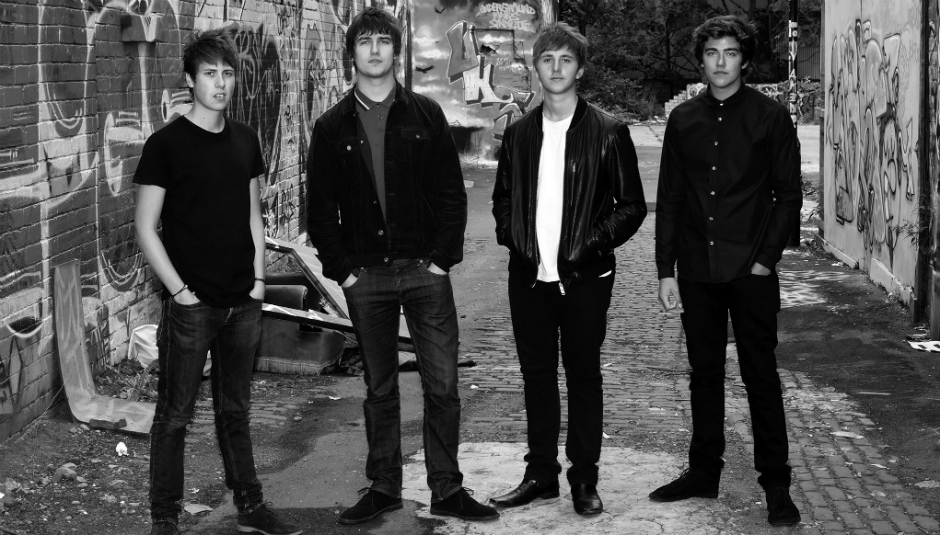This week, The Sherlocks’ debut album Live For The Moment entered the UK Album Charts at No.6. Reflecting on the Sheffield four piece’s undoubtable achievement this week, Michael Hann in the Spectator argued that the Sherlocks are part of a wave of acts – alongside Blossoms and The Courteeners – that “might as well not exist” to “the self-appointed tastemakers of British pop”. In an article titled ‘The Music Snobby London Critics Love to Ignore’, Hann argued that a London dominated British music journalism elite is consciously ignoring British guitar acts because these bands are popular and from the North. The focus of the article was “the straightforward indie rock band who are hugely popular in the north – the north-west especially – but whose fame falls off a cliff the moment you get south of Birmingham”. “Not even despised” is Hann’s diagnosis of how the media responds to these bands, “just ignored”. The reality tells a different story.
To put it bluntly – these are bands that do get attention. In the last week alone, you could turn on BBC2 and watch Blossoms performing at the Mercury Music Prize, where their self-titled debut album was nominated for that prestigious industry gong (nominated not by the public but by an elite of largely London based musicians and critics). The Saturday of the same week, you could pick up a copy of the Guardian and enjoy an in-depth live review by Dave Simpson of a Sherlocks concert. And was this gig in "snobby London"? No, it was at Newcastle Academy where Simpson declared that “the traditional indie rock band is alive and well’”.
You may be unlikely to find a glowing review of the latest Courteeners album on a site like, say, the Quietus, but now that the Courteeners headline arenas and stadiums they’re subject to the same long-form interviews in publications such as Q or NME as their similar-sized contemporaries. There’s a case that the success of the Courteeners was overlooked – they emerged as interest was waning in British post-Libertines guitar music – but this has been largely redressed as they have got more successful.
I look at the music press in Britain right now and struggle to share the Spectator’s assessment that daily arts newspapers and specialist music magazines are united in their ignorance of traditional guitar indie. Does So Young magazine really ignore guitar indie? Does Louder Than War? Similarly, these are band that get playlisted on national radio stations – Radio 1 and 6Music sometimes, but more frequently on stations such as Radio X. Korda Marshall of Infectious – the label that signed the Sherlocks – makes the point that it’s increasingly hard to break traditional acts, despite it being “real music” for “real fans”. “Real music” is a depressingly obviously trope that has in its sights anything that falls outside its narrow spectrum – coming loaded with assumptions about authenticity, pop, and gender. It others in an instant the majority of music fans in the UK who may not be interested in traditional guitar indie, but represent the lifeblood of the industry by going out to gigs, buying records, and reading online music sites. British music is at its worst when it looks like a heritage industry, and if young audiences are more taken by grime or modern pop then that’s just another example of pop music’s forward drive – just as night follows day, Merseybeat followed skiffle and house music followed disco.
Nobody is saying that an artist has to push the envelope or be achingly contemporary to be relevant, but if music journalism has an inherent bias towards the new, the innovative, and an investigation of audience’s direction of travel, then this strikes me as a sign of rude health, not of lost focus. The Stone Roses are used as a reference point in the Spectator article – were they indie press darlings at the time because said press was more geographically balanced? No, it’s because the Stone Roses could synthesise influences as diverse as West Coast psychedelia, CAN, black funk and contemporary rave culture and make something startling and original. You would be hard pressed to listen to the Sherlocks record Live For The Moment and draw the same conclusions. (It shouldn’t need repeating either, that the stereotype of the North as a citadel of Red Stripe chugging Twang fans is utterly wrongheaded, and airbrushes decades of radicalism from the places that have consistently produced some of Britain’s most innovative music, from the Fall to GNOD.)
In the Spectator article, Conrad Murray of SJM – someone who has done genuinely brilliant things for guitar music in this country – was interviewed and criticised the “subconscious anti-northern agenda” present in the music press. But is this an anti-northern agenda or is it not actually a reflection of an industry that increasingly shuts the door to working class people? This, not the north-south divide, feels more correct to me – something that the centre-right Spectator curiously failed to touch on. It’s wrong to blame these failures on a caricature (“too-hip-to-dance”) of the music press. Yes, it’s vital that music publications ensure that the sounds they cover and the writers they commission cover the span of the UK – and the best editors are striving tirelessly right now to do so. And with print media in a state of permanent crisis, whilst freefalling ad revenue derails online music publishing, it’s not hard to envisage this only getting worse – the emergence a genuine London elite where music journalism is the preserve of those with capital in the bank and property in the metropolis. Music journalism in this country is better and livelier than it ever has been – but it should be supported, rather than denigrated, at a time when support is what it most needs.
I recently spoke to musician and activist Billy Bragg about this. “Broadly speaking, I would go for a class thing over a geographical thing,” Bragg told me. “It’s a working-class thing – since Oasis and Blur, working-class culture has been marginalised once again and it’s as much to do with who is able to make music and get access to the wherewithal to do that than it used to be. The dole was my apprenticeship and that’s much, much harder to do now. There are so few working-class voices out there and it’s more to do with that than any geographical aspect. I did my Peel lecture three or four years ago and I used Jake Bugg as an example – how he’d just come through, and how straightforward it was for me to do that and how difficult it is now. At the time he was the exception to the rule.”
If traditional guitar indie is, as the article points out, developing its own support system in which it can exist – a network of artists, promoters and club nights – then this too is actually healthy and closer to the experience of most musicians in the UK. Healthier certainly than to sit in a position of relative privilege in the industry whilst crying that the world won’t listen. This, incidentally, does form some of the appeal for traditional guitar indie now – it feeds an intoxicating underdog narrative that’s central to the fan and artist relationship in the genre – but to many, it can just sound like an entitlement that grates, a howl to take back control from a remote elite. If traditional guitar indie has a problem, it isn’t the fault of the music press, it’s a conscious failure to – to quote the Sherlocks’ new album – live for the moment.






















